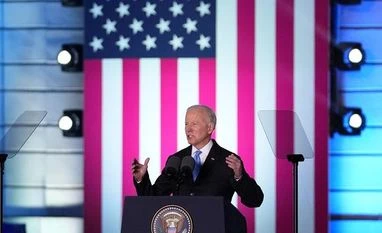President Joe Biden on Thursday launched the largest release ever from the U.S. emergency oil reserve and challenged oil companies to drill more in an attempt to bring down gasoline prices that have soared during Russia's war with Ukraine.
The announcement comes as part of a broad effort by Biden to tackle raging inflation that has hurt U.S. consumers and threatens Biden's fellow Democrats as they seek to maintain control of Congress in the November elections.
Starting in May, the United States will release 1 million barrels per day (bpd) of crude oil for six months from the Strategic Petroleum Reserve (SPR), he said.
"This is a moment of consequence and peril for the world, and pain at the pump for American families," Biden said at an event at the White House.
"It's also a moment of patriotism," Biden said, as he asked oil company executives to serve their customers and American families, instead of the investors they have rewarded with billions of dollars in dividends.
He also called on Congress to make companies pay a fee if they are sitting thousands of unused oil and gas leases and wells on public lands.
Also Read
Biden's 180 million-barrel release is equivalent to about two days of global demand, and marks the third time Washington has tapped the SPR in the past six months.
It will more than cover oil exports to the United States from Russia, which Biden banned this month. Russia typically produces about 10% of the world's crude, but only accounts for 8% of U.S. liquid fuel imports.
But the release will fall short of a loss of about 3 million bpd of Russian oil which the International Energy Agency estimates will be lost to global markets amid Western sanctions and as global buyers avoid the oil.
Biden also called on U.S. oil companies to drill more, and for boosts in production of electric vehicles and batteries.
The Biden administration has worked with allies in the IEA in recent weeks to coordinate releases which will bring the total volume to global markets to well over 1 million barrels per day, the official said.
He estimated that the release could push down U.S. gasoline prices anywhere from 10 cents to 35 cents per gallon, depending on how much allies and partners let go from their reserves. Biden said U.S. allies and partners could release an additional 30 million to 50 million barrels.
The IEA, a watchdog representing industrialized nations including the United States, but not Russia, meets on Friday when it may announce a release. The group presided over its fourth coordinated oil release on March 1 of over 60 million barrels of crude - its largest yet. The U.S. portion of the release was about half of that.
U.S. crude oil prices plunged 7% on the news of the latest SPR draw, even as OPEC+, a production group including Saudi Arabia and Russia, stuck to a modest deal to slowly ramp up output. [O/R]
'USE IT OR LOSE IT'
The Biden administration has long said that energy companies are sitting on thousands of unused leases and are slow to open the spigot. Biden called for a "use it or lose it" policy that will seek to push oil companies to take advantage of unused oil leasing permits.
"This is not the time to sit on record profits, it is time to step up" for the good of your country," Biden urged oil executives.
Oil companies say they https://www.reuters.com/world/us/big-oil-biden-administration-spar-over-blame-pain-pump-2022-03-10 like to have a deep inventory of permits to give them flexibility on future planning and that labor and logistical constraints can be a headwind in using them.
The American Petroleum Institute, the sector's main lobbying group, said the SPR tap could provide some near term supply relief, but was not a long term solution.
"Instead of managing from crisis to crisis, we should be focused on promoting policies that avoid them altogether through increased production of our nation's domestic energy resources," said Frank Macchiarola, an API official,
Biden also invoked the Defense Production Act to support the production and processing of minerals and materials used for large capacity batteries used in electric vehicles - such as lithium, nickel, cobalt, graphite, and manganese. He also called on Congress to pass his climate plan so the country can eventually move beyond fossil fuels.
(Reporting By Timothy Gardner, Alexandra Alper, Steve Holland, Christopher Gallagher and Ismail Shakil; Editing by Marguerita Choy)
(Only the headline and picture of this report may have been reworked by the Business Standard staff; the rest of the content is auto-generated from a syndicated feed.)
)